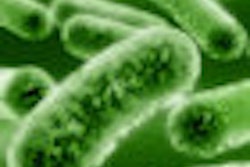
NEW YORK (Reuters Health), Nov 14 - As prophylaxis against ventilator-associated pneumonia, the probiotic bacterium Lactobacillus plantarum 299 (Lp299) is as effective as the antiseptic chlorhexidine in reducing the pathogenic bacterial load in the oropharynx of tracheally intubated, mechanically ventilated, critically ill patients, results of a pilot study indicate.
In the study, 50 critically ill patients on mechanical ventilation were randomly assigned to standard oral mechanical cleansing followed by washing with either 0.1% chlorhexidine solution or an emulsion of Lp299. Cultures were taken from the oropharynx and trachea at inclusion and at defined intervals thereafter.
"We found no difference between the effect of Lp299 and chlorhexidine used in oral care procedures, when we examined the effects of those agents on colonization of potentially pathogenic bacteria in the oropharynx," Dr. Bengt Klarin from University Hospital in Lund, Sweden, and colleagues report in BioMed Central's open access online journal Critical Care.
Potentially pathogenic bacteria that were not present at inclusion were identified in oropharyngeal samples from 8 of the patients in the Lp299 group and 13 patients in the chlorhexidine group. Analysis of tracheal samples yielded similar results.
According to Dr. Klarin and colleagues, Lp299 was recovered from the oropharynx of all patients treated with it and there were no apparent adverse effects with its use.
Using Lp299 in oral decontamination procedures is "microbiologically attractive," Dr. Klarin noted in a written statement. "As the bacteria adhere to the oral mucosa, they are able to counteract potentially pathogenic bacteria around the clock, which is superior to the fairly short-term effect of orally applied chemical agents," Dr. Klarin explained.
Moreover, "chlorhexidine is diluted and inactivated by saliva, and since bacteria can be resistant to chlorhexidine, a low concentration (which will regularly occur between oral care treatments) represents an additional risk of selection and emergence of resistant strains," the investigators explain in their report.
Lp299, on the other hand, is genetically stable and is not likely to incorporate resistance genes or plasmids or to transfer genetic material. "Consequently, it does not contribute to the development of antibiotic-resistance strains," Dr. Klarin noted.
Lp299 also does not have the common side effects associated with oral use of chlorhexidine, including tooth discoloration, irritation, and occasionally serious allergic reactions.
Crit Care 2008.
Last Updated: 2008-11-13 8:00:06 -0400 (Reuters Health)
Copyright © 2008 Reuters Limited. All rights reserved. Republication or redistribution of Reuters content, including by framing or similar means, is expressly prohibited without the prior written consent of Reuters. Reuters shall not be liable for any errors or delays in the content, or for any actions taken in reliance thereon. Reuters and the Reuters sphere logo are registered trademarks and trademarks of the Reuters group of companies around the world.



















